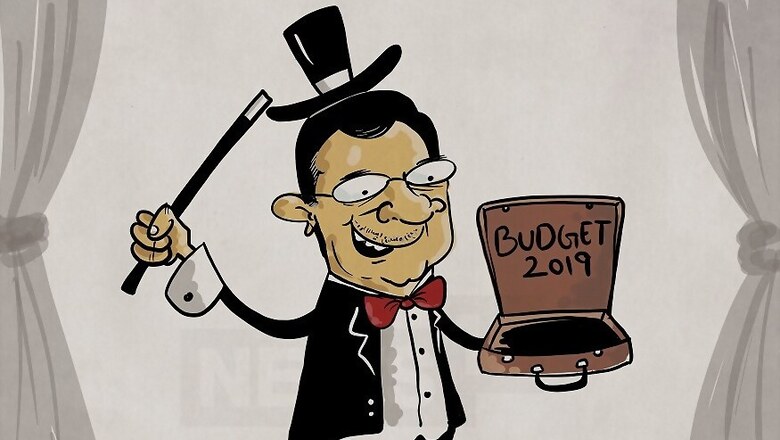
views
The NDA Government’s first full-fledged Union Budget in its second term comes at a crucial juncture. The Indian economy has been passing through a difficult phase of late and the country is looking to the Budget to present a roadmap to recovery. The Finance Minister has her task cut out as she prepares to tackle sagging growth, soaring unemployment, and slackening consumption. Indeed, she must walk a tightrope — balancing fiscal consolidation with necessary growth stimuli.
The current crisis can be traced to an unprecedented credit crunch with banks wary of lending due to bad experience with Non-performing Assets (NPAs). This has slowed down private investment and, in turn, job creation.
At the same time, dwindling disposable incomes have left consumers with lesser purchasing power, completing a vicious cycle. The Budget must look to build momentum for investment by making allocations for public capex, while also incentivising private investors. It must also address the employment issue and induce higher consumption to unshackle the economy. In order to revive the economy, I would like to see the FM target strategic interventions under the following broad heads:
Infrastructure is a critical sector as it generates derived demand besides being the second largest employer after agriculture. The government must increase budgetary allocations to maintain the momentum on construction of roads and highways. It must also earmark funds to expedite the completion of key projects like Bharatmala, Sagarmala, high-speed trains, expanding metro connectivity, and upgrading of ports. Fast-tracking the proposed dedicated freight corridors can be a game-changer for logistics. Extending tax holidays and simplifying land acquisition norms will help attract private investment. The government may consider issuing tax-free bonds for raising long-term capital to finance infrastructure projects.
Real estate is similar to infrastructure in having a multiplier effect on the rest of the economy, but has seen a pronounced slump in recent times. The government must look to rationalise the tax burden by subsuming stamp duty under the Goods and Service Tax (GST), restoring input tax credit and relaxing Minimum Alternate Tax (MAT), besides implementing a single-window clearance for developers. It must also inject liquidity by relaxing norms for Real Estate Investment Trusts and raising lending limits for Housing Finance Companies (HFCs) and Non-Banking Financial Companies (NBFCs). Extending infrastructure status to the whole sector and relaxation of External Commercial Borrowing norms will also ease inflow of a capital. More direct tax sops to home buyers is likely to translate into increased sales.
Including power projects under investment-linked deductions scheme and restructuring of loans will provide huge relief to developers saddled with stressed assets. After a quiet Interim Budget, the renewables sector expects enhanced allocations for i) developing a Green Corridor to boost transmission, ii) strengthening the grid for smooth integration of RE, and iii) supporting emerging technologies like floating solar and storage.
Subsidies and tax incentives will help popularise rooftop solar installations. A crucial reform I expect the government to initiate is to restore financial and operational health of discoms so they can reduce losses, pay their dues timely and honour RPOs. The sector also awaits rationalisation and long-term clarity on GST.
I also expect a clear action plan for fast tracking usage of eco-friendly electric vehicles, including enhanced access to funds, tax credits and duty exemptions for manufacturers, subsidies for buyers and adequate charging infrastructure. Allocation of funds and tax incentives to encourage in-house R&D will further underline the government’s commitment to a cleaner future.
The Budget must also ring in the next generation of agricultural reforms to transform the rural economy, create more jobs and boost demand. Increased public expenditure on developing agri-infra like micro-irrigation, cold storage units, a national warehouse grid will help augment farm income. The government should also consider increased allocations for schemes such as MGNREGA and the Deen Dayal Grameen Kaushal Yojana.
This Budget should announce rationalisation of corporate and income tax rates. A universal reduction in corporate tax rate to 25% will generate an investible surplus, and bring tax rate in line with other major economies, thus enhancing our global competitiveness. Corporate Social Responsibility (CSR) spend should be counted as expense and not under profits. Similarly, direct tax reforms will leave more money in hands of consumers and stimulate consumption and savings. The Budget would do good to announce tweaks such as raising basic exemption limit to Rs 5 lakh, upward revision of tax slabs, and enhancing investment limits under Sec 80C and 80D as well as deduction for interest on home loans.
To create more jobs, the government must design a programme where it identifies, invests in and incentivises sectors with maximum employment potential like food processing, textiles, construction, manufacturing, tourism and retail – forming Special Economic Zones (SEZs) with subsidised land, tax holidays and import duty exemptions can be a preferred route. The Skill India initiative should also receive higher budgetary allocation as it makes people more productive and employable.
The Budget must also set aside funds for recapitalisation of banks as a healthy banking system alone can meet the demand for credit and keep the wheels of economy in motion. Progressive reduction of government stake in PSU banks will allow fresh infusion of funds and make them more efficient and autonomous. Strategic disinvestment can also be a source of funds for the government, and it can show positive intent by using the Budget to unveil a disinvestment schedule, targeting loss making PSUs and others with idle assets.
I hope the upcoming Budget will steer our economy back on the growth track, carry forward the reforms agenda, and set the foundation for a stable, forward looking policy environment. It is a great opportunity for a government which has only just received a mammoth mandate, to show it can deliver in tough situations, by lifting the economy out of troubled waters through a well-conceived mix of reforms and fiscal stimuli.
(The writer is the chairman and managing director of ReNew Power. Views are personal.)
















Comments
0 comment